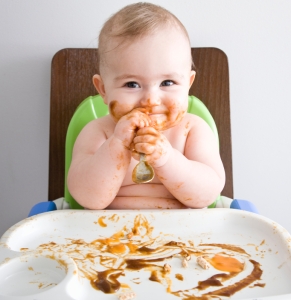(844) 5-SPEECH
Why it’s OK to Get Messy at Mealtime
March 26, 2015
Many parents will spend a lot of time and effort trying to avoid making a mess. Maybe you don’t want to dirty yet another adorable outfit of your little fashionista, or maybe you are sick of wiping the sticky coating off of all the surfaces those tiny fingers touch. But there are many reasons why it is actually very beneficial to let your baby or toddler get messy when eating. So grab your favorite bib and read below:
- Sensory Play
Babies learn about the world and their environment by using all of their senses. Often times, when babies mouth things they can be unsafe or unsanitary (eg. sandbox, playdough, etc). When eating, babies can explore their sense of taste, texture, smell, and sight in a safe manner. Integration of multiple senses helps for healthy neurodevelopment.
- Feeding Skills
Although it may take a little longer, be patient enough to let your toddler feed him or herself. At 18 to 24 months, toddlers can usually feed themselves but may need some assistance. At 24-36 months toddlers can typically self feed independently. The only way your toddler will improve his or her feeding skills is through practice, which may mean more applesauce gets around the mouth than in! Help guide your child and reduce frustration, but allow for some independence.
- Oral Motor Skills
If you constantly wipe your baby’s mouth after every spoonful, your child will not have the opportunity to feel the food that is left on their upper lip. The child will have no need to use their tongue to lick the perimeter of the lips. Additionally, if you are spoon feeding your baby and scoop the spoon up to get a nice clean bite, the baby has no need to use their lips to clear the food off of the spoon. These are missed opportunities to build oral motor strength, coordination, and range of motion. Instead, wait until the end of the meal to wipe the baby’s mouth. When spoon feeding, place the spoon straight into the baby’s mouth or turn the spoon sideways and let your child use their lips to clear the food (no scooping up!).
- Prevent Tactile Defensiveness
Many children are extra sensitive to certain sensations. By immediately wiping a child’s hands and face, the child may associate being messy with feeling uncomfortable with foreign sensations. Encourage your child to feel a variety of textures and desensitize them. Let them know it is ok to feel something mushy, wet, crunchy, etc.
- Keep Mealtime Positive
For many of our picky eaters, mealtime can be an anxiety-prone situation. Fussing with napkins and wipes after each bite can add unnecessary discomfort. Try to maintain a relaxed, positive attitude during meals and tackle the mess once the meal has ended.
Remember, safety should always be a priority. If the mess is interfering with vision or breathing, immediately clear away the mess. Otherwise, don’t be afraid to start embracing your baby’s mess!
-Nicole Cohen, M.S. CF-SLP
Recent News

Did What You Hear Make Sense?
March 3, 2025

The Importance of Early Intervention
January 27, 2025

How Parents Can Support Everyday Language Building
January 20, 2025

The Benefits of Support Groups for Adolescents Who Stutter
January 13, 2025

3 Common Misconceptions About Autism Spectrum Disorder (ASD)
January 6, 2025

What are Core Words?
December 30, 2024


